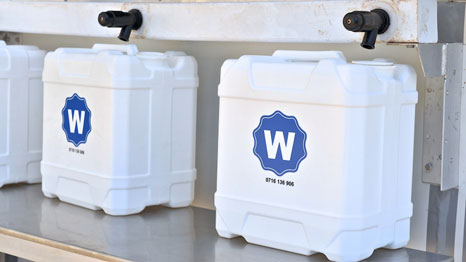Social Marketing
Even good causes need advocates
Drinking freely-available river water is not without its costs: Lost wages at work, medicines, doctor visits, and children missing school can have short and long-term financial implications. Often, the link between contaminated water, insufficient hygiene, and diarrheal diseases is simply not common knowledge. So why pay for water? After all, even it is contaminated, it has always been free. This is why social entrepreneurship needs social marketing – promotion of a good cause – to be successful. Together with KWAHO, we turn health care workers into ambassadors for clean drinking water and promote water quality and hygiene in door-to-door campaigns. With posters, marketing activities for local customers such as free calendars, or a “Free Water Day,” clean drinking water becomes a consumer experience and is positioned as a valuable product for a healthy life.
Changing typical behavior
These efforts stem in part from the results of an independent evaluation conducted by EAWAG, a Swiss research institute for water supply, waste water treatment, and water protection at ETH/Eidgenössischen Technischen Hochschule in Zürich. In 2014, the evaluators visited several Safe Water Enterprise sites and examined social, physical, and personal factors that are decisive for bringing about a change in behavior.
People need to understand the health risks of waterborne diseases that are associated with drinking contaminated water.
A person’s attitude about water affects a change in behavior. This refers to cost-benefit factors, including the cost of the water and the effort to obtain it, as well as emotions associated with water.
This is about social norms that can affect an individual’s behavior regarding drinking water habits. If clean drinking water has already gained acceptance in the community, others will probably join.
Careful examination is needed to determine the number of people in the community, if any, who are able to pay for clean drinking water.
This addresses the question of whether people consider it important to purchase clean drinking water at a kiosk. They should know the source of their drinking water.
On the go with health care worker Isabell Akinyi
Clean to the last mile: The hygienic “W” canister
The water is clean, but what happens to it on the way home? In many cases, it is poured into contaminated containers or is not stored properly. To prevent recontamination, Safe Water Enterprises use white “W” canisters, which are disinfected during every visit to the kiosk. The idea is that the canister’s white look will set it apart from other used and repurposed containers, which are usually blue or yellow. Kiosk operators sell the canisters to the customers. Each time the canister is refilled at the kiosk, it is disinfected with a chlorine solution.

It’s not a perfect system, but customers are still encouraged to use the same canister every time for drinking water. This is effective, and now customers are putting some thought into which container they use to transport their water.
Christine Meinhardt
+49 9131 9207 913
Stephen Njuguna Wamuyu
+254 722 912 574


